6 Best Docker Alternatives
Written by: Hrishikesh Pardeshi, Founder at Flexiple, buildd & Remote Tools.
Last updated: Dec 06, 2024
Best Docker Alternatives in 2025 are:
Podman
LXC/LXD
Containerd
CRI-O
Kubernetes
OpenVZ
Docker has revolutionized the way developers build, ship, and run applications by providing a robust platform for container technologies, including Docker containers. However, as the technology landscape evolves, several Docker alternatives have emerged, offering unique features and capabilities that cater to diverse needs in managing containers. Whether you're seeking enhanced security, better resource management, or more flexible orchestration, exploring these alternatives can help you find the perfect tool for your projects. This comprehensive guide delves into the top Docker alternatives in 2024, providing detailed insights into each platform to assist you in making an informed decision.
If you're searching for alternatives to Docker, these platforms offer a wide range of containerization and virtualization solutions. Whether you prioritize security, scalability, or ease of use, these alternatives cater to various preferences, ensuring that developers and organizations have ample options to choose from.
Table of Contents
- Why You Need Alternatives to Docker?
- Who Should Consider Using Docker Alternatives?
- Best Docker Alternatives
- Docker Alternatives Comparison Table
- Additional Features to Consider When Choosing Docker Alternatives
- How to Choose the Right Alternative to Docker?
- Conclusion
- Frequently Asked Questions (FAQs) On Docker Alternatives
Why You Need Alternatives to Docker?
Docker remains a leading containerization platform, but it is not the perfect fit for every use case. Several factors drive the need to explore Docker alternatives.
Enhanced Security
Docker's containerization model, including docker desktop and lxc containers, while effective, has certain security limitations. Alternatives like Podman offer daemon-less architectures, reducing potential attack surfaces and enhancing security for containerized applications.
Improved Resource Management
Some alternatives provide better resource management and efficiency, allowing for optimized performance and scalability. Platforms like Kubernetes offer advanced orchestration capabilities that surpass Docker's native functionalities.
Flexibility and Customization
Different projects have unique requirements. Alternatives like LXC/LXD offer more granular control over container configurations, enabling greater flexibility and customization for specialized applications.
Open Source and Community Support
Open-source alternatives often benefit from vibrant communities that contribute to rapid development and feature enhancements. Containerd, for instance, is backed by a strong community that continuously improves its performance and capabilities.
Integration with Existing Ecosystems
Certain alternatives integrate seamlessly with existing infrastructure and tools, providing a cohesive environment for development and deployment. CRI-O, designed for Kubernetes, ensures smooth integration and efficient container runtime management.
Who Should Consider Using Docker Alternatives?
Exploring Docker alternatives is beneficial for various user groups:
Enterprise Organizations
Large enterprises with complex infrastructure needs may require advanced orchestration, security, and scalability features that certain Docker alternatives offer. Platforms like Kubernetes provide robust solutions for managing containerized applications at scale.
Security-Conscious Developers
Developers and organizations prioritizing security can benefit from alternatives that offer enhanced security features, such as Podman's daemon-less architecture and improved isolation mechanisms.
Resource-Constrained Environments
In environments where resource optimization is critical, alternatives like Containerd offer lightweight container runtimes that minimize overhead and maximize efficiency.
Open Source Enthusiasts
Those who prefer open-source solutions with strong community support will find platforms like LXC/LXD and Containerd appealing, as they offer extensive customization and continuous improvements driven by community contributions.
Developers Seeking Flexibility
Projects requiring specialized container configurations or unique deployment scenarios can leverage the flexibility and granular control provided by alternatives like LXC/LXD and OpenVZ.
Best Docker Alternatives
Docker has revolutionized containerization, but it’s not the only tool available for managing and deploying containers. A variety of alternatives have emerged, each offering unique capabilities, tailored use cases, and distinct advantages. From lightweight solutions for single containers to robust platforms for orchestrating complex workloads, these tools cater to developers and organizations seeking flexibility, performance, or specific integrations. Below, we explore the best Docker alternatives and what sets them apart.
1. Podman
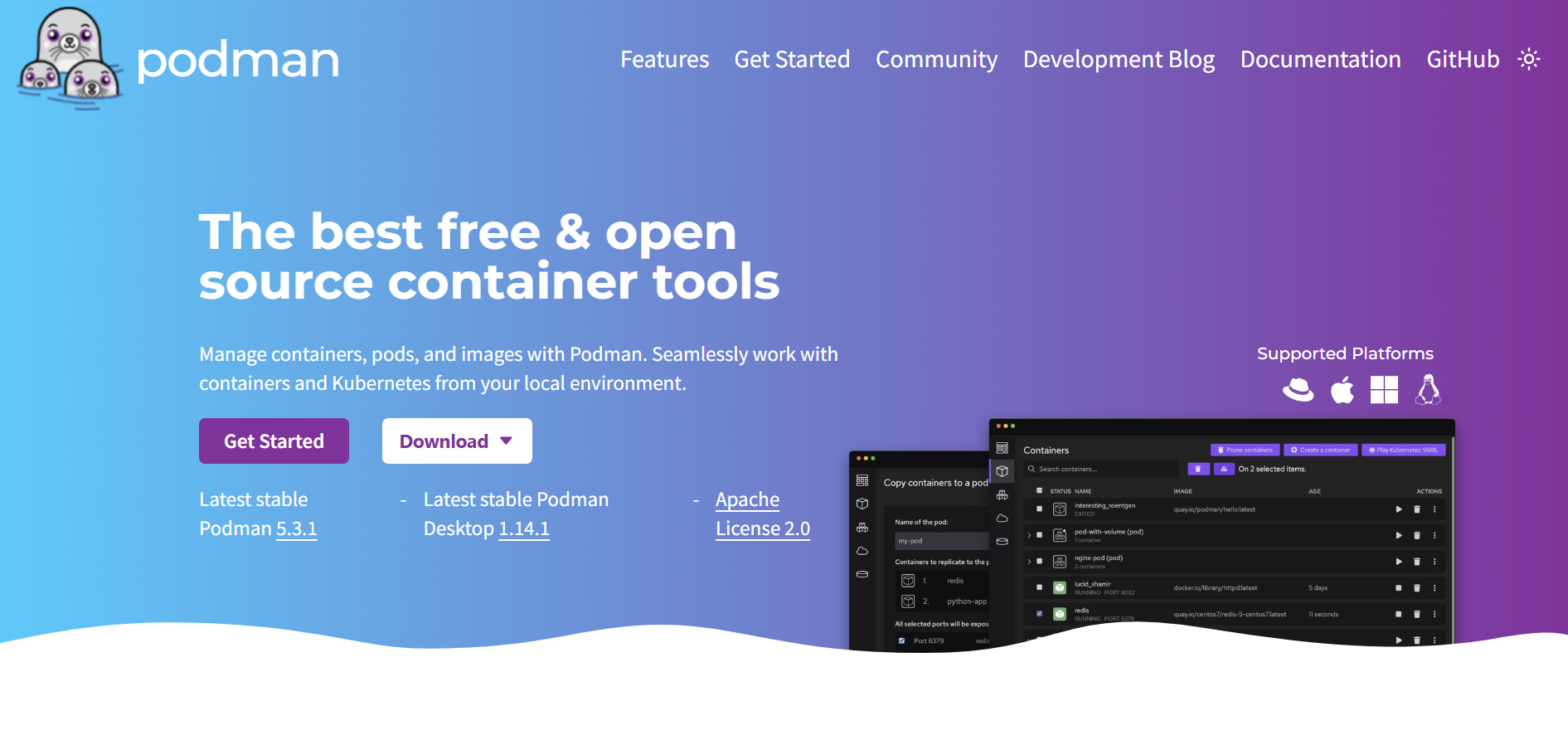
Podman is a daemon-less container engine for developing, managing, and running OCI containers on your Linux system. Its rootless mode enhances security by allowing users to run containers without requiring root privileges.
Podman vs Docker
Podman offers a command-line interface that is compatible with Docker, making it easy for Docker users to transition. Unlike Docker, Podman does not require a daemon to run in the background, reducing the potential attack surface and improving system security.
Key Features of Podman
Daemon-less Architecture: Eliminates the need for a central daemon, enhancing security and reducing resource usage.
Rootless Containers: Allows users to run containers without root privileges, minimizing security risks.
Docker CLI Compatibility: Supports Docker commands, facilitating an easy transition for existing Docker users.
Pod Management: Enables the management of pods, groups of containers that share the same network namespace, similar to Kubernetes pods.
Podman Pros
Enhanced security with rootless mode.
No need for a central daemon, reducing system overhead.
Compatibility with Docker CLI commands.
Supports pod management for better container orchestration.
Podman Cons
Limited support for Windows and macOS compared to Docker.
Smaller community and ecosystem compared to Docker.
Some advanced Docker features may not be fully supported.
Podman Pricing
Podman is an open-source project and is free to use under the Apache License 2.0.
3. LXC/LXD
LXC (Linux Containers) and LXD (the next-generation system container manager) provide lightweight virtualization by leveraging the Linux kernel's container capabilities. They offer a more traditional virtualization experience compared to Docker's application-centric approach, where the docker daemon helps to build container images efficiently.
LXC/LXD vs Docker
LXC/LXD focuses on system containers, which encapsulate an entire operating system, allowing for more comprehensive isolation and management. Docker, on the other hand, is designed for application containers, which are optimized for running individual applications.
Key Features of LXC/LXD
System Containers: Encapsulate a full Linux operating system, providing complete isolation.
Advanced Networking: Offers sophisticated networking options, including bridged, macvlan, and more.
Resource Management: Fine-grained control over system resources such as CPU, memory, and storage.
Image Management: Supports a wide range of container images and templates for easy deployment.
LXC/LXD Pros
Comprehensive isolation with system containers.
Advanced networking and resource management features.
Suitable for running multiple applications within a single container.
Strong integration with Linux systems.
LXC/LXD Cons
Steeper learning curve compared to Docker.
Less focus on application-centric containerization.
Limited support for Windows environments.
LXC/LXD Pricing
LXC/LXD is open-source and free to use under the GNU Lesser General Public License (LGPL).
4. Containerd
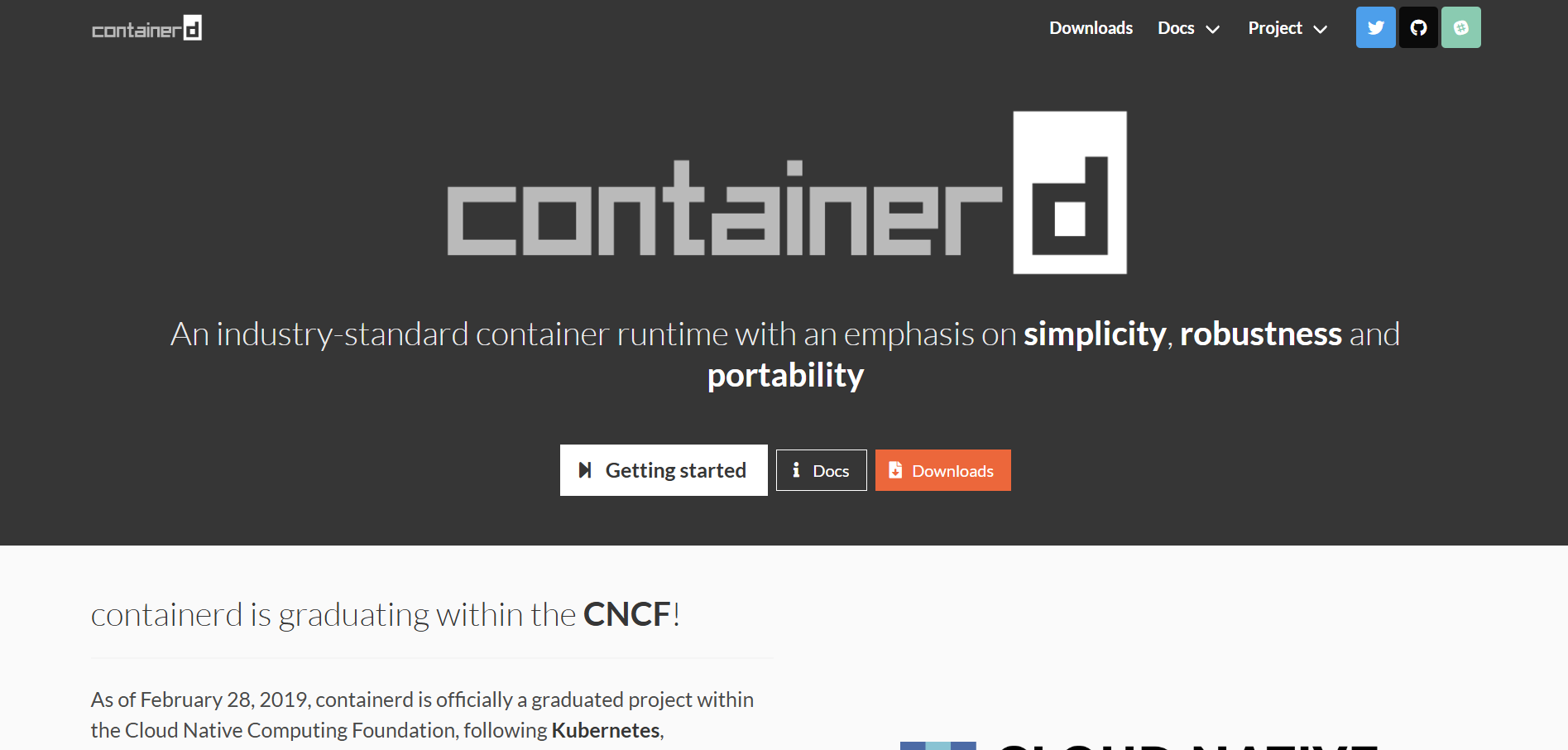
Containerd is an industry-standard container runtime that emphasizes simplicity, robustness, and portability. It is designed to be embedded into larger systems, such as Docker and Kubernetes, providing a reliable foundation for container management.
Containerd vs Docker
Docker is a complete platform for building, shipping, and running containers, whereas Containerd focuses solely on container runtime functionalities. Docker itself uses Containerd under the hood, making Containerd a core component for container management in various environments.
Key Features of Containerd
Lightweight Runtime: Provides essential container runtime functionalities without additional overhead.
CRI Compatibility: Integrates seamlessly with Kubernetes through the Container Runtime Interface (CRI).
Extensible Architecture: Supports plugins and extensions for enhanced functionality.
Multi-Platform Support: Compatible with various operating systems and architectures.
Containerd Pros
Lightweight and efficient container runtime.
Strong integration with Kubernetes and other orchestration tools.
Highly extensible and customizable.
Active development and strong community support.
Containerd Cons
Does not provide a full container management platform like Docker.
Requires integration with other tools for a complete container ecosystem.
Limited standalone usage for end-users compared to Docker.
Containerd Pricing
Containerd is an open-source project and is free to use under the Apache License 2.0.
5. CRI-O
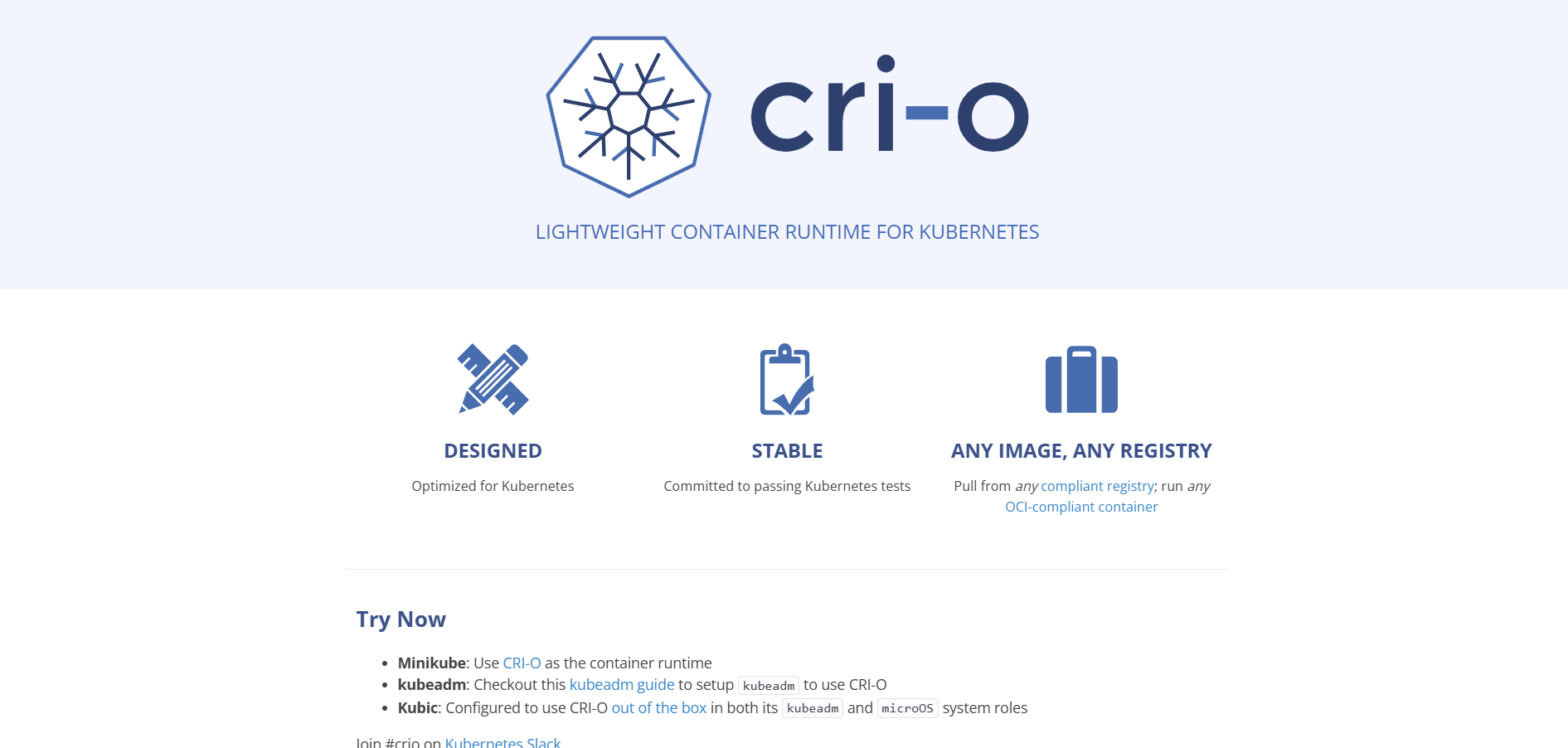
CRI-O is an open-source, lightweight container runtime specifically designed for Kubernetes. It adheres to the Kubernetes Container Runtime Interface (CRI), ensuring seamless integration and optimal performance within Kubernetes clusters.
CRI-O vs Docker
CRI-O is tailored for Kubernetes, providing a streamlined container runtime that focuses on compliance with the CRI. Unlike Docker, which offers a broader range of container management features, CRI-O is optimized for Kubernetes environments, ensuring better performance and lower overhead.
Key Features of CRI-O
Kubernetes Integration: Built specifically for Kubernetes, ensuring tight integration and compatibility.
Lightweight Runtime: Minimizes resource usage by focusing solely on container runtime functionalities.
OCI Compliance: Fully supports the Open Container Initiative (OCI) standards for container images and runtimes.
Security Enhancements: Implements security best practices and supports secure container deployments.
CRI-O Pros
Optimized for Kubernetes, ensuring high performance and reliability.
Lightweight and efficient, reducing system overhead.
Fully compliant with OCI standards.
Enhanced security features tailored for containerized environments.
CRI-O Cons
Limited functionality outside of Kubernetes environments.
Smaller community and ecosystem compared to Docker.
Requires Kubernetes knowledge for effective usage.
CRI-O Pricing
CRI-O is an open-source project and is free to use under the Apache License 2.0.
6. Kubernetes
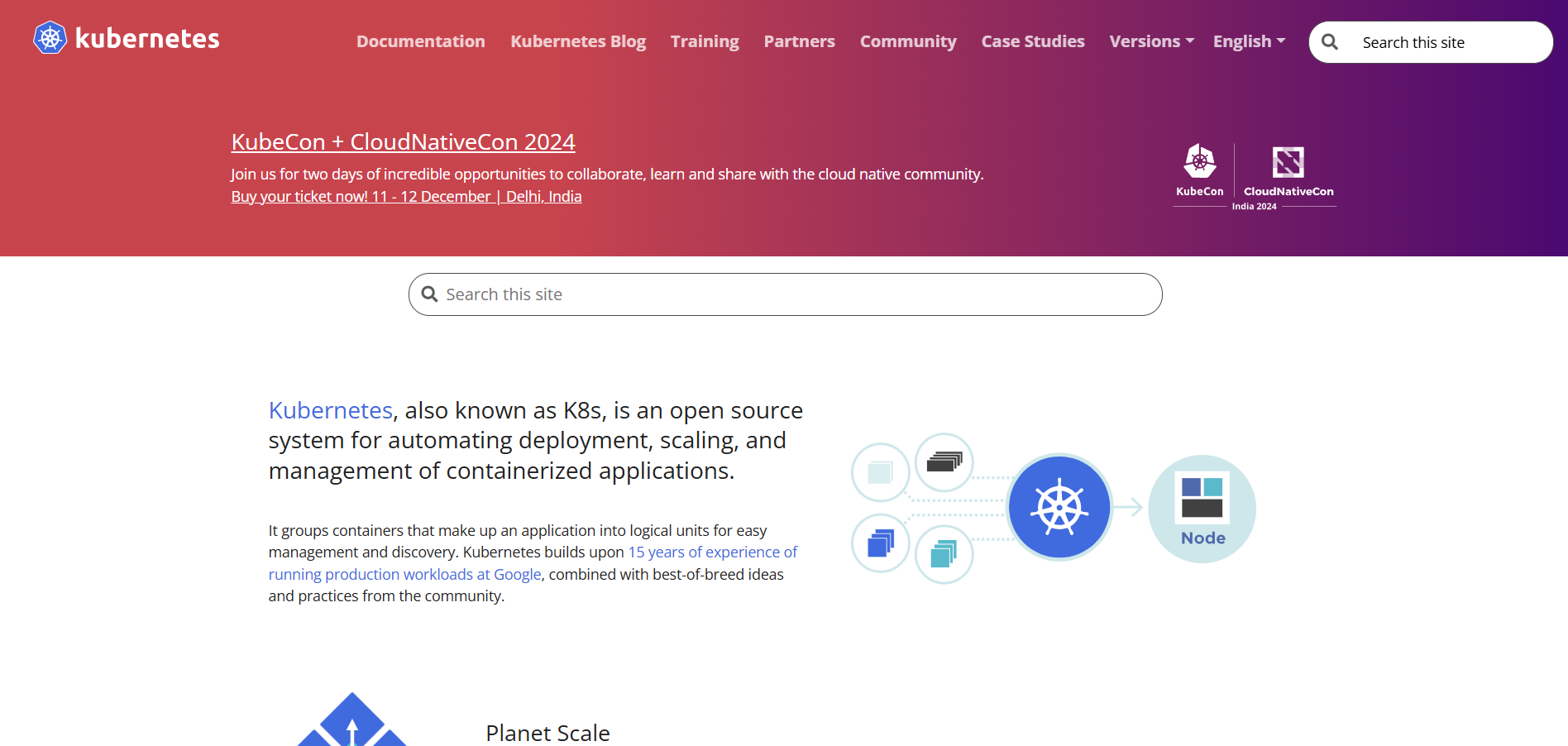
Kubernetes is an open-source container orchestration platform that automates the deployment, scaling, and management of containerized applications. While not a direct alternative to Docker, it serves as an essential component in modern containerized environments.
Kubernetes vs Docker
Kubernetes and Docker serve different purposes within the container ecosystem. Docker focuses on containerizing applications, while Kubernetes manages and orchestrates those containers at scale. Kubernetes can work with various container runtimes, including Docker, Containerd, and CRI-O.
Key Features of Kubernetes
Automated Deployment and Scaling: Manages the deployment and scaling of containerized applications automatically.
Service Discovery and Load Balancing: Provides built-in mechanisms for service discovery and load balancing.
Self-Healing: Automatically replaces and reschedules containers that fail or become unresponsive.
Storage Orchestration: Manages storage resources for containers, allowing for persistent storage solutions.
Kubernetes Pros
Robust orchestration capabilities for managing large-scale container deployments.
Highly scalable and flexible, suitable for diverse workloads.
Strong community support and extensive ecosystem of tools and extensions.
Multi-cloud and hybrid-cloud compatibility, enabling seamless deployments across various environments.
Kubernetes Cons
Steep learning curve, requiring significant expertise to manage effectively.
Complex setup and maintenance compared to simpler container runtimes.
Resource-intensive, which may be overkill for small-scale projects.
Kubernetes Pricing
Kubernetes is an open-source project and is free to use. However, deploying Kubernetes on cloud platforms may incur costs based on the chosen provider and resource usage.
OpenVZ
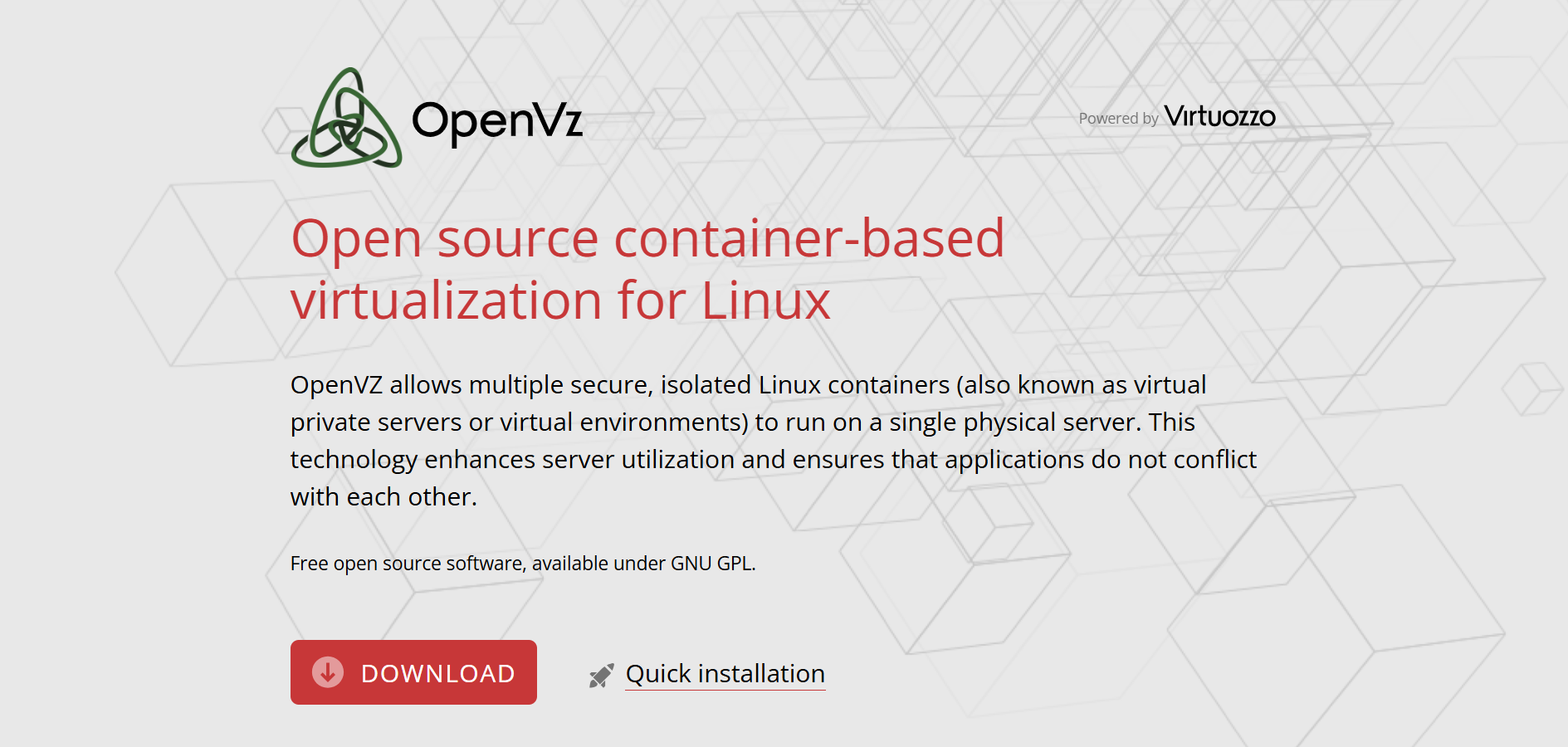
OpenVZ is a container-based virtualization solution for Linux that provides isolated environments called containers or Virtual Environments (VEs). It offers high performance and efficient resource utilization, making it suitable for hosting multiple isolated instances on a single physical server.
OpenVZ vs Docker
OpenVZ focuses on providing full virtualization through isolated containers, each with its own operating system instance. Docker, in contrast, is designed for application-centric containerization, focusing on packaging and deploying individual applications within containers.
Key Features of OpenVZ
Operating System-Level Virtualization: Provides full virtualization by isolating containers at the OS level.
Resource Management: Offers fine-grained control over CPU, memory, and disk usage for each container.
Template System: Utilizes templates for quick and consistent container deployments.
Live Migration: Supports live migration of containers between physical hosts without downtime.
OpenVZ Pros
High performance with minimal overhead due to OS-level virtualization.
Efficient resource utilization, allowing multiple containers on a single server.
Robust resource management and isolation features.
Supports live migration, enhancing flexibility and uptime.
OpenVZ Cons
Limited to Linux environments, restricting cross-platform compatibility.
Less focus on application-centric containerization compared to Docker.
Smaller community and ecosystem compared to more popular container platforms.
OpenVZ Pricing
OpenVZ is an open-source project and is free to use under the GNU General Public License (GPL). However, commercial support and enterprise features are available through Virtuozzo, the company behind OpenVZ.
Docker Alternatives Comparison Table
| Feature | Podman | LXC/LXD | Containerd | CRI-O | Kubernetes | OpenVZ |
|---|---|---|---|---|---|---|
| Ease of Use | Easy | Moderate | Moderate | Moderate | Challenging | Moderate |
| Pricing | Free | Free | Free | Free | Free | Free & Paid Plans |
| Platform Support | Linux, macOS | Linux | Linux, Windows | Linux | Cross-Platform | Linux |
| Orchestration | Limited | Basic | Integrated with Kubernetes | Designed for Kubernetes | Advanced | Basic |
| Security | High | Moderate | High | High | Variable | High |
Additional Features to Consider When Choosing Docker Alternatives
When choosing a Docker alternative, it's essential to consider various factors that can enhance your containerization experience. Here are some additional features to keep in mind:
Scalability
Scalability is crucial for applications that experience varying workloads. Ensure that the platform you choose can handle scaling your containers up or down based on demand, providing flexibility and maintaining performance.
Integration with CI/CD Pipelines
Seamless integration with Continuous Integration and Continuous Deployment (CI/CD) tools can streamline your development workflow. Look for platforms that offer robust APIs and support for popular CI/CD tools to automate your build and deployment processes.
Monitoring and Logging
Effective monitoring and logging are vital for maintaining the health and performance of your containerized applications. Choose platforms that provide built-in monitoring tools or integrate well with external monitoring solutions to keep track of your containers' status and performance metrics.
Networking Capabilities
Advanced networking features, such as service discovery, load balancing, and network policies, can significantly enhance your containerized applications' connectivity and security. Ensure that the platform you choose offers comprehensive networking options to meet your application's requirements.
Storage Solutions
Persistent storage is essential for applications that require data retention across container restarts. Look for platforms that support various storage solutions, including block storage, file storage, and object storage, to ensure your data is securely managed and accessible.
Community and Ecosystem
A strong community and a vibrant ecosystem can provide valuable resources, support, and integrations. Platforms with active communities are more likely to receive regular updates, bug fixes, and new features, ensuring your containerization solution remains up-to-date and reliable.
Documentation and Support
Comprehensive documentation and reliable support are essential for troubleshooting and optimizing your containerized applications. Ensure that the platform you choose offers detailed documentation, tutorials, and access to support channels to assist you in resolving issues and maximizing the platform's potential.
How to Choose the Right Alternative to Docker?
Selecting the best Docker alternative depends on your specific needs and preferences. Here's a guide to help you make an informed decision:
Assess Your Containerization Needs
Consider the nature of your applications and the specific requirements of your projects. If you need advanced orchestration and scalability, Kubernetes might be the best fit. For enhanced security and rootless container management, Podman could be the ideal choice.
Evaluate Security Requirements
Security is paramount in containerized environments. Assess the security features offered by each platform, such as rootless operation, daemon-less architecture, and isolation mechanisms, to ensure they align with your security policies and standards.
Consider Scalability and Performance
Determine the scalability and performance requirements of your applications. Platforms like Kubernetes and CRI-O are designed for large-scale deployments, while Podman and Containerd offer efficient performance for smaller-scale projects.
Review Integration Capabilities
Ensure that the alternative you choose integrates seamlessly with your existing tools and infrastructure. Consider factors such as CI/CD pipeline compatibility, monitoring and logging integrations, and support for your preferred development frameworks.
Analyze Pricing and Licensing
While many Docker alternatives are open-source and free to use, some may offer commercial support or additional enterprise features at a cost. Evaluate the pricing models and licensing terms to ensure they fit within your budget and usage requirements.
Test and Experiment
Take advantage of free tiers, trials, or demo versions to test the platforms in your environment. Experimenting with different alternatives can provide hands-on experience and help you determine which platform best meets your needs in terms of usability, performance, and feature set.
Seek Community Feedback
Engage with the community through forums, reviews, and case studies to gain insights into other users' experiences with different Docker alternatives. Learning from the experiences of others can help you identify the strengths and weaknesses of each platform and make a more informed decision.
Conclusion
Navigating the world of containerization has become more versatile with the availability of numerous Docker alternatives, including managing containers through solutions like Microsoft Azure Container Registry. Platforms like Podman, LXC/LXD, Containerd, CRI-O, Kubernetes, and OpenVZ offer diverse solutions tailored to different needs, ensuring that developers and organizations can find the perfect fit for their containerization requirements. These platforms facilitate the management of Docker images and containers effectively.
When selecting the right alternative for your projects, consider factors such as security, scalability, integration capabilities, and the specific features each platform offers. By choosing a containerization solution that aligns with your workflow and project goals, you not only enhance your development and deployment processes but also ensure the robustness and efficiency of your applications.
Whether you're a beginner exploring containerization or an enterprise seeking advanced orchestration capabilities, the alternatives to Docker provide ample opportunities to optimize your container management strategies. Embrace these platforms to continue your containerization journey with confidence and flexibility.
Frequently Asked Questions (FAQs) On Docker Alternatives
1. What are the top alternatives to Docker?
The top alternatives to Docker that help manage containers include Podman, LXC/LXD, Containerd, CRI-O, Kubernetes, and OpenVZ. These platforms offer a range of containerization and virtualization solutions, catering to diverse needs such as enhanced security, advanced orchestration, and lightweight runtime management.
2. Why should I consider using an alternative to Docker?
Alternatives to Docker may offer unique features, such as enhanced security, better resource management, specialized orchestration capabilities, or more flexible licensing models. Exploring these options can help you find a containerization solution that better aligns with your specific requirements and preferences.
3. Are Docker alternatives free to use?
Many Docker alternatives are open-source and free to use, including Podman, LXC/LXD, Containerd, CRI-O, Kubernetes, and OpenVZ. Some platforms may offer additional paid features, commercial support, or enterprise-grade solutions, providing flexibility based on your usage needs.
4. Which Docker alternative is best for beginners?
For beginners, Podman and Kubernetes are excellent choices due to their user-friendly interfaces and extensive documentation. Podman offers a familiar command-line experience for Docker users, while Kubernetes provides a comprehensive orchestration platform with robust community support and learning resources.
5. Can I use Docker alternatives for production environments?
Yes, many Docker alternatives like Kubernetes, Podman, and Containerd are designed for production environments, offering robust features, scalability, and security. These platforms are widely adopted in enterprise settings, providing the reliability and performance needed for mission-critical applications.